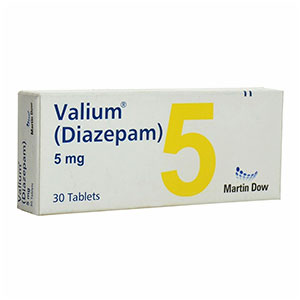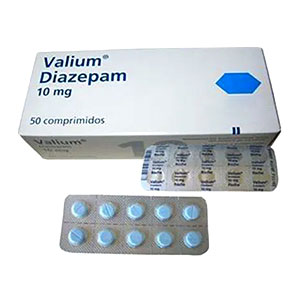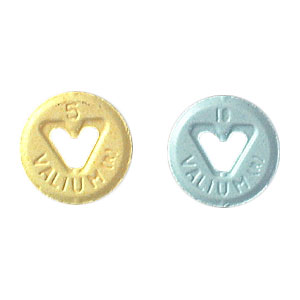The largest price comparison for medicines: the most popular pharmacies in comparison. Buy more than 200 medicines at low prices



Patent: Patent expired
Producer: Hoffmann-La Roche
Dosage: 2mg, 5mg, 10mg
Dosage form: tablet
Unit of measurement: mg
Active ingredient: diazepam
Application areas:
Anxiety disorders, Sleep disorders, Panic disorders, Muscle relaxation
Drug class: benzodiazepines
Onset of action:
Duration of action:

Bioavailability: 50-100%
ATC-Code: N05BA01
Protein binding: none
Metabolism: Liver
Half-life: 50 hours
Excretion: Kidneys
CAS number: 439-14-5
PubChem-CID: 3016
Drug Bank: DB00829
ChemSpider: 2908
UNII: Q3JTX2Q7TU
KEGG: D00293
ChEBI: CHEBI:49575
ChEMBL: ChEMBL12
ECHA-InfoCard: 100.006.476
Formula: C16H13ClN2O
Molar mass: 284,74 g·mol−1
The active ingredient in Valium diazepam has a powerful sedative effect on the body as it acts on the brain's benzodiazepine receptors and increases the effectiveness of gamma-aminobutyric acid (GABA). The drug also possesses muscle relaxant, anxiolytic, antispasmodic and anti-tension properties. In addition, Valium reduces the symptoms of acute alcohol withdrawal, such as tremors and anxiety.
Valium is widely used to treat:
Valium pills start working within 40 minutes of ingestion.
The dosage of Valium should be determined individually by the doctor and depending on the condition, in order to avoid motor impairment or excessive sedation. The required dosage differs between adults and children.
For adults, the usual dosage is 1 tablet in 5 or 10. It should be used once or twice a day, as recommended by your doctor.
For children six months and older, the recommended dosage is between 1 mg and 3 mg, applied three or four times a day.Valium should be taken for a short period of time. However, if you have been taking the drug by mouth for, say, two months, consult your doctor before stopping treatment. If you have been using Valium regularly and want to stop taking it, do so gradually to avoid withdrawal symptoms.If you are elderly or have liver or kidney problems, your doctor will prescribe a lower dose for you. The usual adult dose may be harmful to you. So always follow your doctor's instructions. Valium pills should be swallowed whole with a glass of water. They can be used with or without food.
Withdrawal symptoms
Risk of memory impairment
Risk of psychosis
Mood swings and depression
Drug addiction
Caution in severe liver dysfunction
Particular caution in patients with impaired renal function
Tolerance development
Hypersensitivity to the ingredients
Contraindicated in newborns and infants under 6 months
Severe liver damage
Severe breathing disorders
Sleep apnea syndrome
Severe muscle weakness
Acute intoxication with alcohol, painkillers and sleeping pills or medication for certain mental illnesses
Alcohol, drug or drug dependence, including history
Not safe
Alcohol consumption increases the side effects of medication
Can you mix Valium and alcohol? The effects of Valium are enhanced by the simultaneous consumption of alcoholic beverages. For this reason, alcohol consumption is discouraged.
Do not take a double dose to make up for a forgotten dose. For the next dose, do not take more than the usual recommended amount.
If you suspect an overdose, contact a doctor immediately.
There is a risk of significant interactions. Therefore, medical supervision is recommended.
Valium interacts with antihistamines, antidepressants, antibiotics, drugs for muscle spasms, sleeping pills and pain relievers.
Headache
Dizziness
Fatigue
Fainting
Drowsiness
You should avoid grapefruit and grapefruit juice
The medicinal product must be stored in the dark.
Keep this medicine out of the sight and reach of children.
This medicinal product does not require special storage conditions.
What is Valium?


How fast does Valium work?


How long does Valium work?


How do I get a prescription for Valium?


How quickly does Valium become addictive?


Can I buy Valium over the counter?


Is Valium safe after the expiration date?


Valium belongs to the group of benzodiazepines and is usually prescribed to treat various conditions like insomnia, anxiety, panic disorder, muscle spasms, etc. Because it is a benzodiazepine, it can be addictive. Therefore, this drug is only suitable for short-term treatment of anxiety and insomnia.
Valium was developed by Dr. Leo Sternbach, an employee of the pharmaceutical company F. Hoffmann-La Roche AG. It was first marketed in 1963 as a safe alternative to barbiturates.
From 1969 to 1982, this drug was in high demand and sales were almost uncontrollable until negative reviews dispelled the myth of diazepam's safety. After that, a prescription for this drug was introduced.
However, diazepam still occupies a large niche in the legal use of tranquilizers and anticonvulsants. It is available nowadays in the form of tablets, drops, suppositories and injections.
When given in small doses, Valium drug has few side effects and is well tolerated. However, general side effects can include headaches, drowsiness, dizziness and temporary memory loss.
However, after long-term use, the following symptoms may occur:
In addition, cardiac arrhythmia, respiratory disorders, memory disorders and skin rashes are also possible.
Valium may contain inactive ingredients that may cause allergic reactions before using the drug. Make sure to check with your doctor if you're allergic to it or if you're allergic to any other excipients.
Valium pills contain lactose. If you are lactose intolerant, talk to your doctor or pharmacist before taking this medicine.
Avoid grapefruit and grapefruit juice when using Valium tablets/drops/suppositories/injections as it increases the likelihood of side effects.
Tell your doctor about any comorbidities, especially those related to mental disorders, muscle disorders, respiratory problems, kidney disease, liver disease, and a history of glaucoma.
Valium passes into breast milk and can have adverse effects on a child. Therefore, it is not recommended for nursing mothers, as well as during pregnancy. If you become pregnant while using Valium, consult your doctor immediately and talk to your doctor before breastfeeding your newborn.
Reaction, perception and memory disorders can occur as a result of taking Valium. This impairs the ability to drive. The use of tools and machines is therefore not recommended.
If you suffer from myasthenia gravis, have liver or kidney problems, or have a history of heart problems, talk to your doctor before you buy Valium and take.
The active ingredient in Valium diazepam can interact with other medications. Before taking Valium, tell your doctor if you are taking any of the following medicines:
The benzodiazepines, including Valium, are not suitable for long-term therapy. Valium pills/ drops/ suppositories/ injections are intended for short-term therapy.
According to statistics, the addiction and withdrawal symptoms develop in the patients who have taken Valium for 4 weeks or more. After 6 weeks of treatment there is a risk of pharmacological dependence.
Addiction is most common in people who already have alcohol or drug addictions or who have serious mental health abnormalities (e.g., borderline personality disorder). The risk group also includes elderly patients and children, who require special care during treatment with Valium.
Long-term, uninterrupted use of Valium is associated with the risk of withdrawal syndrome, in which a person may experience severe symptoms. Stopping Valium abruptly sometimes results in depersonalization, photophobia, confusion, and other inappropriate mental responses. Therefore, Valium pills/ drops/ suppositories/ injections should be discontinued gradually.

Hello, I have been afflicted with panic attacks and anxiety since I was 23 years old. The Valium tablets helped me a lot. Because of fear of addiction I took the lowest doses. But that's enough for me.
18.05.2022


Subscribe to our newsletter and get the latest updates and special offers!
Leave a comment
Thank you for sharing your experience!
Your experiences will be published soon!